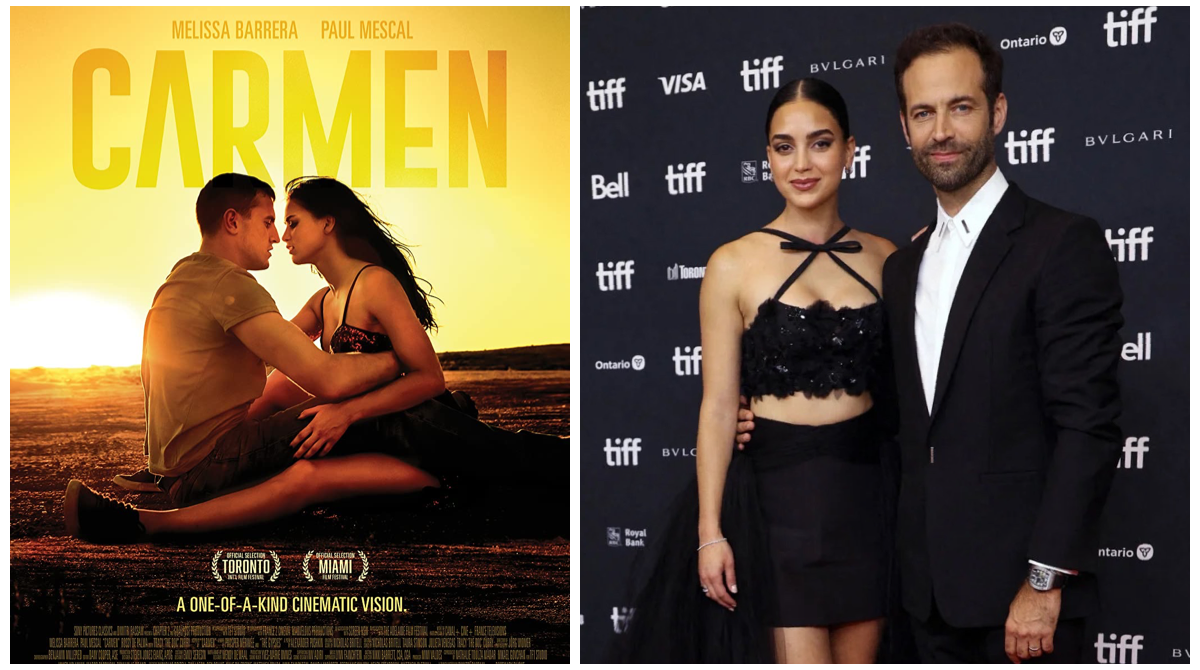We spoke with Carmen’s director Benjamin Millepied and the star of the movie, Melissa Barrera.
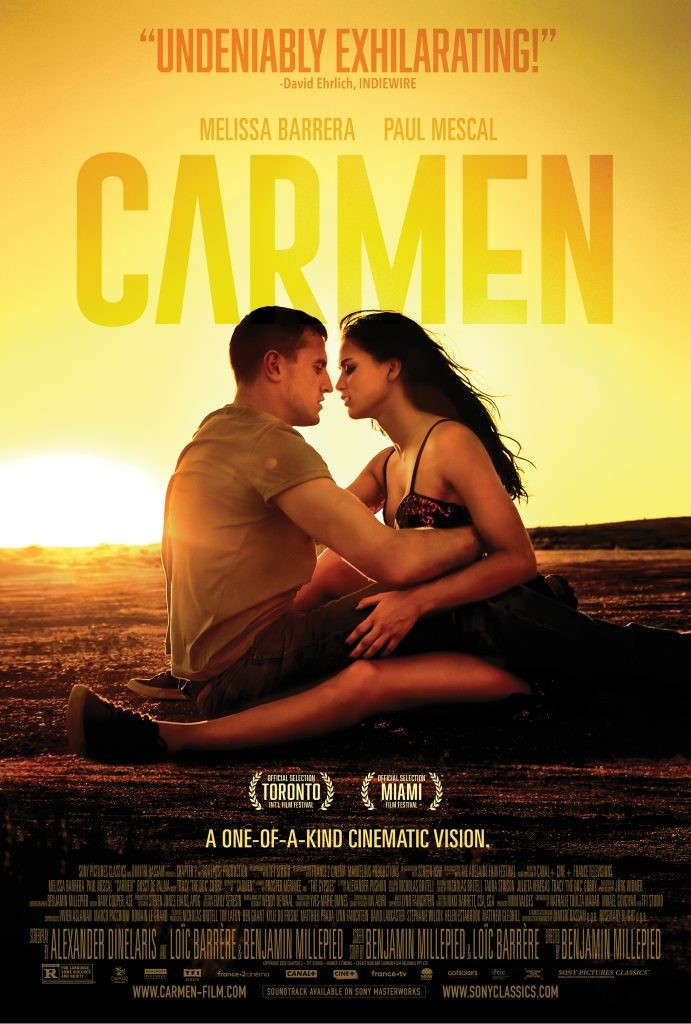
Last week, we spoke with Carmen’s director Benjamin Millepied and the star of his movie, Melissa Barrera. Carmen is Millepied directorial debut, a project he conducted with an absolute passion, technicality and incredible poetry. Benjamin Millepied previously stated that Carmen was the opera of his childhood, and that reinventing this iconic story on the big screen was a dream for him.
For Carmen, the director (as well as world-renowned choreographer, dancer and former director of the Paris Opera Ballet), cast Melissa Barrera (Scream VI, In the Heights), Academy Award Nominee Paul Mescal (Normal People, Aftersun) and Rossy de Palma (Law of Desire, Parallel Mothers). Millepied’s Carmen is not an adaptation of the famous opera, but rather a modern take on a story, a feeling, that has been living within him since he was a child.
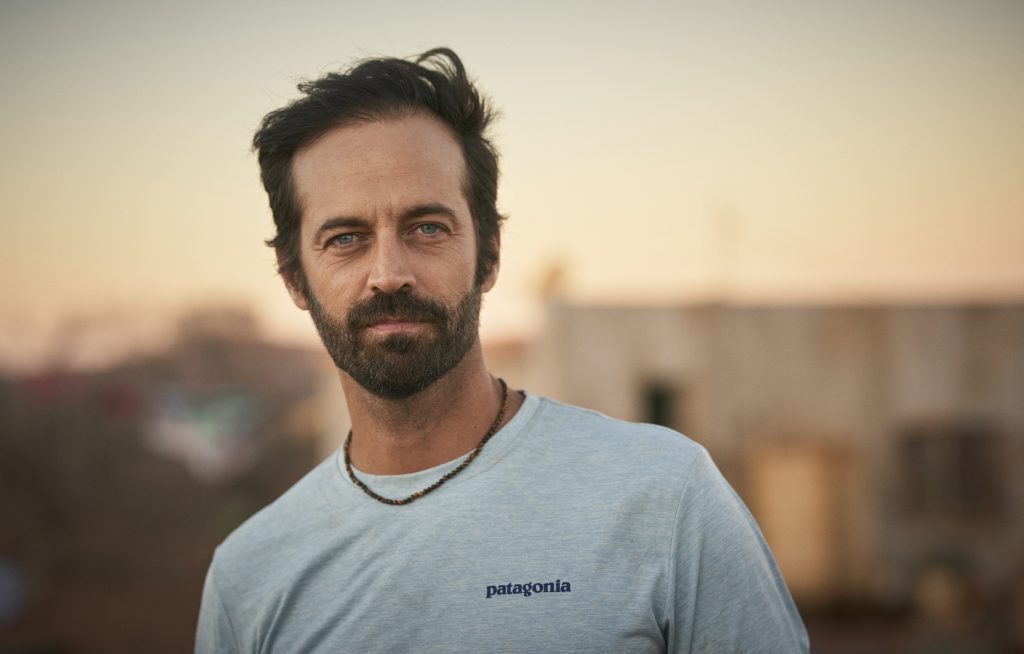
©Goalpost Pictures. Courtesy of Sony Pictures Classics.
Carmen (Melissa Barrera), is a young woman forced to leave her home in the Mexican desert, after her mother was murdered. As she is is crossing the US border, Melissa and a group of other immigrants are confronted to the violence of a border guard. Aidan (Paul Mescal), a marine suffering from PTSD, saves Carmen and kills his patrol partner. Chased by the police, Carmen and Aidan make their way to Los Angeles together, where Carmen finds her mother’s best friend, Matilda (Rossy de Palma), owner of a nightclub.

©Goalpost Pictures. Courtesy of Sony Pictures Classics.
Barrera and Mescal are one of the main strengths of the film, and while most of the time, they don’t have to say much, their piercing gaze and on-screen chemistry are enough to elevate even the simplest shot. As for Rossy de Palma as the fairy godmother of dancing and utter self-belief, she is simply iconic. The story of our two lovers on the run is interspersed by bewitching and haunting dancing and singing sequences, where the gorgeous cinematography, the play of lights and breathtaking scenery, all meet as the culmination of Millepied and music composer Nicholas Britell’s experimental project.

©Goalpost Pictures. Courtesy of Sony Pictures Classics.
A night shoot in the desert, resulting in a scene where Carmen dances (or rather ”flies” ) with a group of women, particularly stood out for Melissa Barrera:
‘’ I had an out-of body-experience. I don’t know, I kind of left my body, I don’t know how it happened. But when Benjamin yelled ‘Cut!’, he ran over to me and he was like ‘How did you do that?’ And I was like ‘What do you mean? ’ and he was like ‘ You were flying. That was incredible’”.
You can watch and read our full interviews with Melissa Barrera and Benjamin Millepied down below:
FW: Congratulations on Carmen, I’ve watched it twice already now, and I can’t tell you how much it I loved it. It is incredibly beautiful, and almost feels like an out-of-body experience when you’re watching it. To me, it almost feels like a fever dream. As a director, how would you describe this whole experience where you got to touch so many kinds of art ?
BM: It’s an incredible experience! Because the beauty in making films, is that you work on these visions by yourself for a while. You have these ideas and images in your head, and then you select people to come and inspire that. (…) It is a communal experience with people who are going to enrich your vision. It’s an intense, short amount of time where you’re lifted and carried through this process of creativity and collaboration. The day that the process ends, when you’re finished with the film, before you go editing, the drop from that high… I mean I think I was depressed for like 2 weeks. There’s a phenomenal high you get from creating, from the energy of people working towards a common goal.
FW: Can you walk me through how you chose to use dancing instead of talking in certain sequences? For example, when they’re driving to LA and stop in the middle of the night, Carmen dances with a group of women, and you’ve got the fireworks and old amusement park around them. Why did you chose this moment for this incredible dance scene?
BM: I think it’s the first time he sees her. And you see her express so much of who she is through that dance, through the freedom of that dance. And that’s not something you’ve seen at that point in the movie. You understand who she is (…) if you had to hold her back, I mean, this is not a woman you can pin down. You can love her by loving that freedom she embodies.
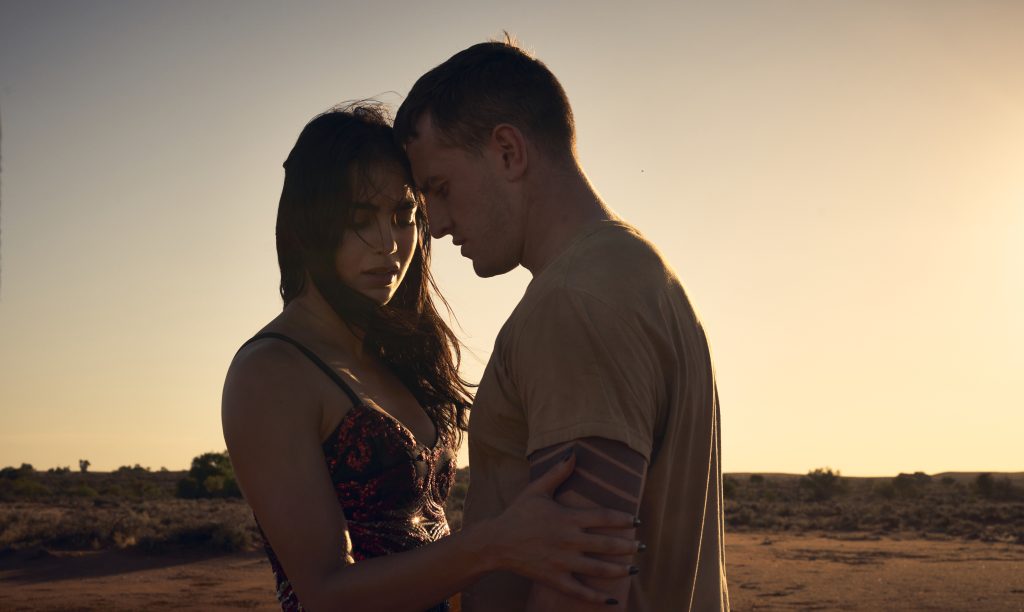
FW: As I said, the cinematography of this film is incredible, but there’s a very short shot in particular that really stood out for me: It is the one where we see Carmen from the back, and she’s facing a guitar player in this sort of out of this world, surreal moment of beautiful dancing among the fireworks. It feels like she’s being hypnotized by him, and then she goes and dances and it’s just so beautiful: For you as a director, what is a moment that, on the page, felt like a pretty regular scene to shoot, and ended being much more complex, maybe even your favorite and still stands out for you now ?
BM: I think I had this idea that I would be able to move, when I had a very large scene with a big group pf people. I mean, I like shooting a big group of people, and I think I had this idea that I would be able to move them and to choreograph at a speed that I know I can achieve. However, if you have people who’ve never followed directions, it’s actually impossible. And I realized that very quickly when I arrived on set and I tried to create sequences that I wanted to be complex, there was no way I could do it with people who had no experience at all. And I was like ‘oh well, that’s what Martin Scorsese does, when he’s using people who are used to moving in space with other people, who have the experience of being on film’. I had to scrap and simplify all the time sequences with large group of people, because I would need three days instead of two hours.
FW: But would you say that the final result, the final film, is close to your original vision then?
BM: Absolutely, absolutely. I worked hard to create the atmosphere of the film. The music came before, it influenced the picture. Yeah, absolutely.
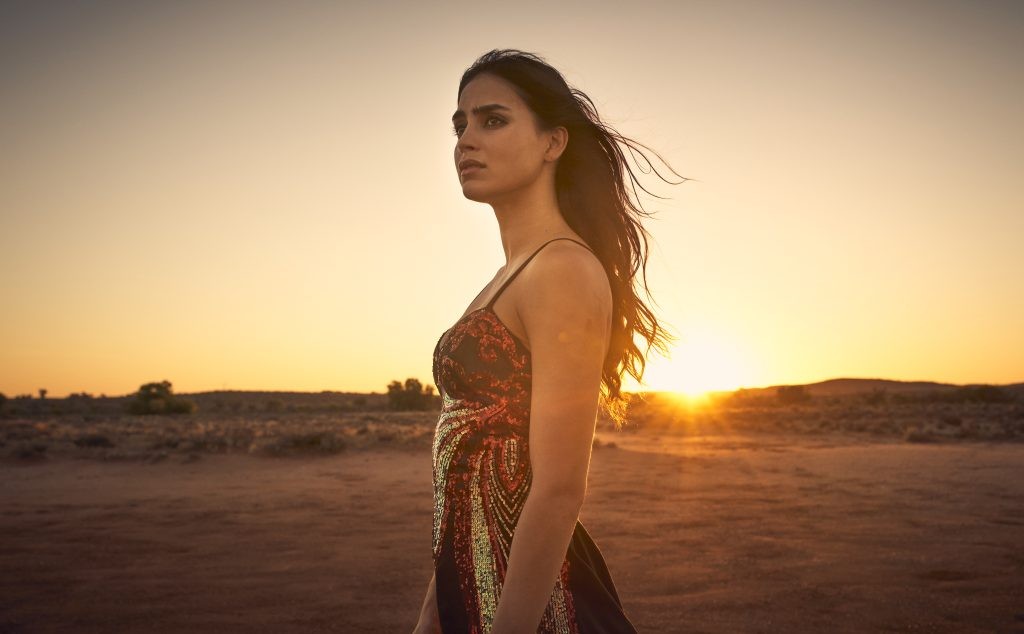
©Goalpost Pictures. Courtesy of Sony Pictures Classics.
FW: The characters break the fourth wall many times during the film, directly looking at the camera, at the audience. Was it a way to feel like you were connecting to the audience like you would on a stage?
BM: Yeah, I mean what’s great with films, is you can move the eye of the viewer wherever you want. That’s so freeing, to be able to do that, and not just have the stage. You can create so much, you have music, light, the feelings of someone on screen who maybe ins’t speaking, but is feeling so much and they’re expressive, you feel that into your own emotions and body, it’s pretty magical. So yeah, I loved all of it.
FW: You take us dancing with your camera, you bring it, in the middle of these dancers, and it twirls and it spins and it really feels like we’re dancing with them. For you, taking the camera front and center of these sequences, was it a way to show the audience something you maybe aren’t able to show when you choreograph a show on stage ?
BM: Absolutely, I mean, absolutely! The immersive quality and the movement, the sweeping movement of the camera, that is such a fun way to kind of like, fly with the dancers. You’re literally allowing the audience to move with the dancers, when you’re moving with the camera.

FW: I read before that Carmen was an important ballet and opera for you as a kid. How much of how you felt as a kid, watching Carmen, did you bring into the making of your film ? Is there a particular feeling you wanted to share with the audience, and did you feel the same making it as when you were watching it as a child ?
BM: I was always intrigued by this female character. And also I loved the music, and Carlos Saura, and Paco de Lucía, this kind of grounded, deep dance, filled with sexuality. It is something that stayed with me and lives in my movie.
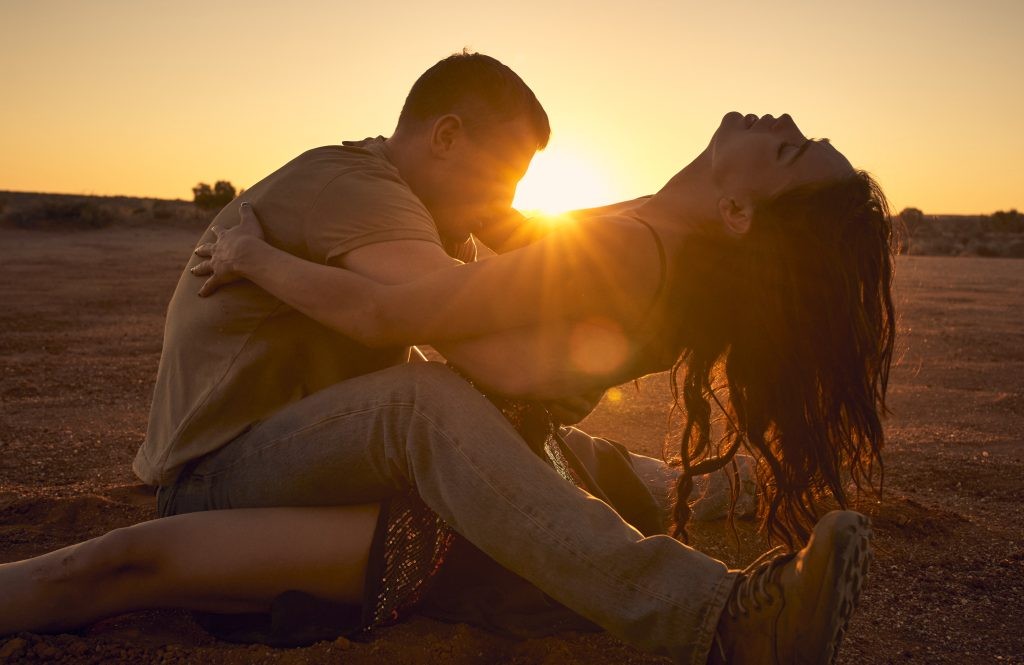
FW: Carmen uses dancing as a way to cope with grief and anger, but also to find herself, to feel closer to the women in her life. For you, when making this film and with dancing in general, when did you feel the closest to your art and to yourself ?
BM: I think I had to feel close to it with every scene that I shot. It is exhilarating to feel like you’re putting the camera in the right place for the scene. Like, I was feeling exhilarated even if we just got the right shot of the desert, just because it feels like this is the right one. It’s pretty much always exhilarating to me.
FW: Thank you so much Benjamin, congratulations again! I hope you will be able to adapt another ballet or opera soon again!
BM: Thank you so much! And yes, soon enough!

